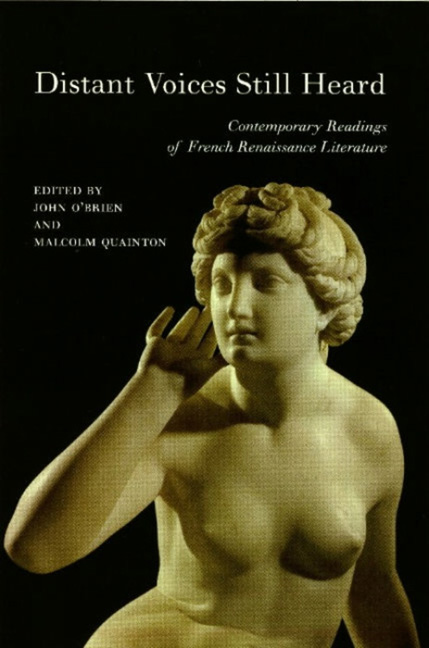Book contents
- Frontmatter
- Contents
- Editors’ Foreword
- Introduction: The Time of Theory
- 1 The Highs and Lows of Structuralist Reading: Rabelais, Pantagruel, chapters 10—13
- 2 Rabelais’ Strength and the Pitfalls of Methodology: Tiers Livre, chapters 7–18
- 3 ‘Blond chef, grande conqueste’: Feminist Theories of the Gaze, the blason anatomique and Louise Labé's Sonnet 6
- 4 Louise Labé's Feminist Poetics
- 5 Reading and Writing in the Tenth Story of the Heptaméron
- 6 Fetishism and Storytelling in Nouvelle 57 of Marguerite de Navarre's Heptaméron
- 7 Creative Choreography: Intertextual Dancing in Ronsard's Sonnets pour Hélène: II, 30
- 8 An Overshadowed Valediction: Ronsard's Dedicatory Epistle to Villeroy
- 9 ‘De l'amitié’ (Essais 1.28): ‘Luy’ and ‘Moy’
- 10 Montaigne's Death Sentences: Narrative and Subjectivity in ‘De la diversion’ (Essais 3.4)
- Select Bibliography
- Index
8 - An Overshadowed Valediction: Ronsard's Dedicatory Epistle to Villeroy
- Frontmatter
- Contents
- Editors’ Foreword
- Introduction: The Time of Theory
- 1 The Highs and Lows of Structuralist Reading: Rabelais, Pantagruel, chapters 10—13
- 2 Rabelais’ Strength and the Pitfalls of Methodology: Tiers Livre, chapters 7–18
- 3 ‘Blond chef, grande conqueste’: Feminist Theories of the Gaze, the blason anatomique and Louise Labé's Sonnet 6
- 4 Louise Labé's Feminist Poetics
- 5 Reading and Writing in the Tenth Story of the Heptaméron
- 6 Fetishism and Storytelling in Nouvelle 57 of Marguerite de Navarre's Heptaméron
- 7 Creative Choreography: Intertextual Dancing in Ronsard's Sonnets pour Hélène: II, 30
- 8 An Overshadowed Valediction: Ronsard's Dedicatory Epistle to Villeroy
- 9 ‘De l'amitié’ (Essais 1.28): ‘Luy’ and ‘Moy’
- 10 Montaigne's Death Sentences: Narrative and Subjectivity in ‘De la diversion’ (Essais 3.4)
- Select Bibliography
- Index
Summary
The epistle placed by Ronsard at the head of his Amours Diverses in the 1584 edition of his Oeuvres opens as a valedictory farewell to poetry, to love, and more broadly to the active life at court the poet had spasmodically pursued throughout most of his mature career. But the tone of this valediction, as it emerges in the opening thirty lines, is not easy to categorise, mingling as it does regret, self-satisfaction, foreboding, resignation, fatalism, and pride. The note of personal apprehension, specifically the fear of advancing age, illness, and death, is sounded in the very first line, which evokes a future of a winter racked with bodily storms. But this private tempest will merge, as the poem continues, with the public tempests of past and future that have nearly undone the body politic of the French nation, riven as it has been for twenty years by savage religious conflict. It is against that prospect that the poet counts his fifty-six years, an age considered more advanced by his era than ours, seeming to abjure the composition of poetry in line 3 (although he is of course occupied in writing a longish poem) and to abjure sexual pursuits (although his text prefaces a collection of ‘Amours’). Taking leave of ‘[le] plus beau de mes jours’ (‘the best days of my life’: l.4), he knows that any hope of inner serenity is likely to be undermined by the tormented nation about him, sinking ever deeper into anarchy.
Yet there is an astonishing composure in the retrospective view of his life which, he writes, has tasted all the pleasures. The phrasing here is elegant: the speaker has tasted as a connoisseur the range of pleasures, but, with discrimination guided by reason, has only admitted some to his friendship:
Je les ay tous goustez, et me les suis permis Autant que la raison me les rendoit amis.
I have tasted them all, and allowed myself / As many of them as reason made welcome as friends: ll. 7–8.
This is a ripe and judicious epicureanism that makes companions of self-indulgences but assigns to each that measure of intimacy appropriate to the speaker's role and dress upon the stage of life.
- Type
- Chapter
- Information
- Distant Voices Still HeardContemporary Readings of French Renaissance Literature, pp. 171 - 184Publisher: Liverpool University PressPrint publication year: 2000



